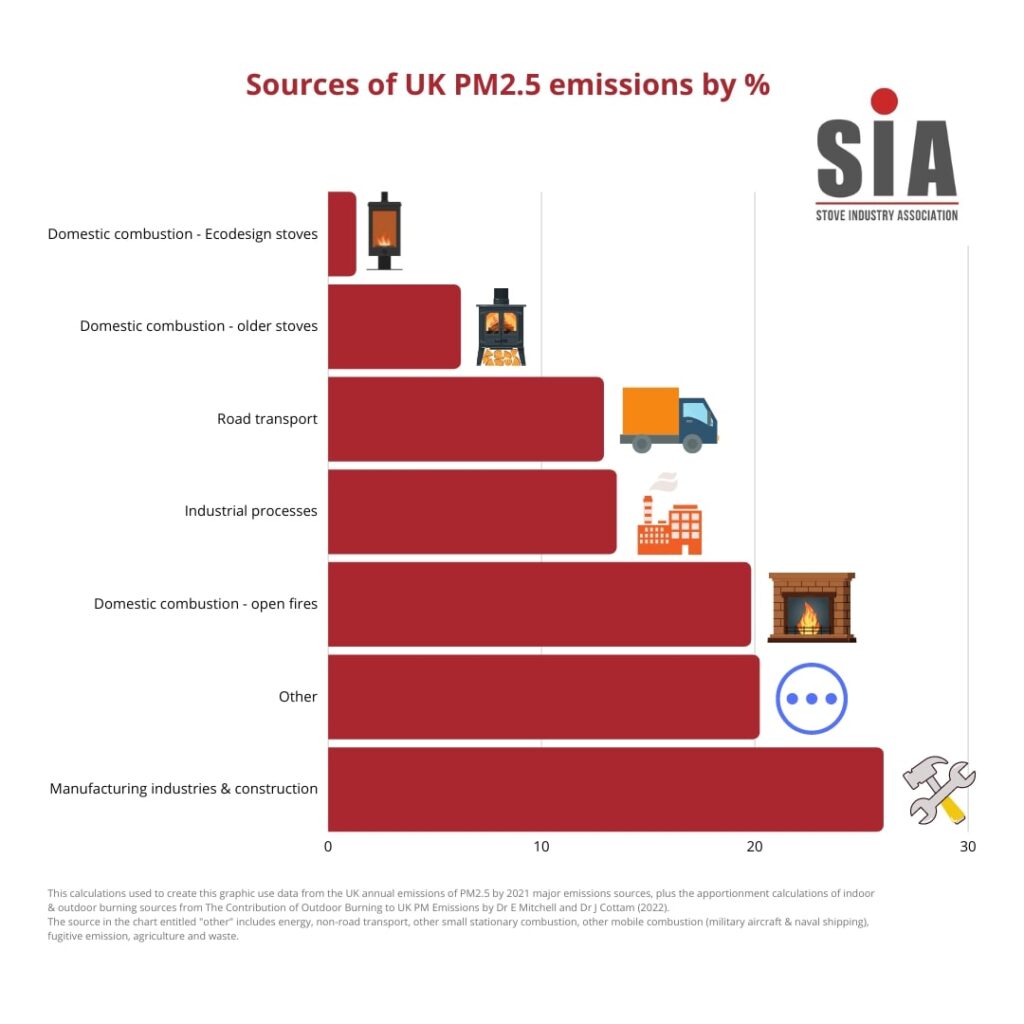- BY Sweepsmart
- POSTED IN Uncategorised
- WITH 0 COMMENTS
- PERMALINK
- STANDARD POST TYPE
As environmentalists continue to debate how to mitigate the effects of climate change, an increased focus on sustainable living and eco-friendly heating solutions has emerged. Wood burning stoves have long been popular for their warmth and rustic charm, but their future has recently been called into question due to concerns over particulate matter (PM2.5) emissions. At SweepSmart London, we think that wood burning stoves should have a future, and we’re here to explain why.
The debate on wood burning and PM2.5 emissions
PM2.5 emissions refer to particulate matter that is 2.5 micrometres or smaller, which can cause respiratory issues and other health problems when inhaled. The main concern surrounding wood burning stoves is their contribution to these emissions. However, it’s essential to consider the nuances of this debate, as not all wood burning stoves are created equally.
Modern, efficient wood burning stoves are designed to produce far fewer emissions than their traditional counterparts. For instance, the eco-design stoves have been developed in line with their regulations, aiming to reduce the environmental impact of burning wood. These stoves have a significantly lower PM2.5 emission rate compared to older stoves and open fires.
Additionally, it’s crucial to consider the type of fuel being burned. Burning wet or unseasoned wood can produce significantly more emissions than burning dry, seasoned wood. By promoting proper fuel usage and responsible burning practices, the environmental impact of wood burning stoves can be significantly reduced.

The advantages of wood burning as a heating solution
Despite the concerns surrounding PM2.5 emissions, wood burning stoves offer several benefits that make them an attractive heating solution for many homeowners:
Renewable Energy Source
Wood is a renewable energy source that can be sustainably harvested and managed. In comparison to fossil fuels, which are finite resources and produce significant greenhouse gas emissions, wood burning stoves offer an eco-friendly alternative for heating homes.
Carbon Neutral
When wood is burned, it releases the same amount of carbon dioxide as it absorbed during its growth. This means that, in theory, burning wood is carbon neutral. That said, it’s essential to consider factors such as transportation and manufacturing processes to gain a full understanding of a stove’s carbon footprint.
Energy Efficiency
Modern wood burning stoves can achieve efficiency levels of over 80%, meaning they use a high percentage of the energy generated from burning wood. This makes them far more efficient than traditional open fires, which can have efficiency levels as low as 20%.
Rural Economies
The use of wood burning stoves can have a positive impact on rural economies by supporting local woodland management and creating jobs in the forestry and fuel supply sectors.

The future of wood burning: a balanced approach
In order to ensure a sustainable future for wood burning stoves, a balanced approach that considers both the benefits and drawbacks is necessary. There are several steps that can be taken to reduce the environmental impact of wood burning stoves:
Ecodesign Ready Stoves
Encouraging the adoption of Ecodesign Ready stoves is a crucial step towards reducing PM2.5 emissions. These stoves are designed to meet the strict EU regulations and have a significantly lower environmental impact than older models.
Education and Awareness
Raising awareness of the importance of proper fuel usage and responsible burning practices can help to reduce the emissions produced by wood burning stoves. This includes promoting the use of dry, seasoned wood and discouraging the burning of wet or unseasoned wood.
Regular Maintenance
Ensuring that wood burning stoves are regularly serviced and maintained can help to optimise their performance and reduce emissions. Chimney sweeps, like SweepSmart London, play a vital role in keeping stoves clean and functioning efficiently.
Government Support
Governments can contribute to a more sustainable future for wood burning stoves by offering incentives for the adoption of Ecodesign Ready stoves and supporting initiatives that promote responsible wood burning practices.

Sweeps brush
Research and Development
Continued investment in research and development can help to create even more efficient and environmentally friendly wood burning stoves. This includes exploring new materials, technologies, and design improvements that can reduce emissions further.
The future of wood burning stoves is undeniably complex, with both environmental concerns and the undeniable benefits of this heating solution needing to be carefully considered.
By adopting a balanced approach that encourages responsible wood burning practices, the use of Ecodesign Ready stoves, and continued research and development, it’s possible to create a more sustainable future for wood burning stoves.
At SweepSmart, we’re committed to helping homeowners enjoy the warmth and charm of wood burning stoves while minimising their environmental impact. Our expert chimney sweeps ensure that stoves are maintained and functioning efficiently, and we’re always happy to provide advice on responsible wood burning practices. By working together, we can ensure that wood burning stoves remain a viable and eco-friendly heating solution for years to come.
Contact us now if you would like to make an appointment, have a question about our services, or you’re just in need of some advice.









